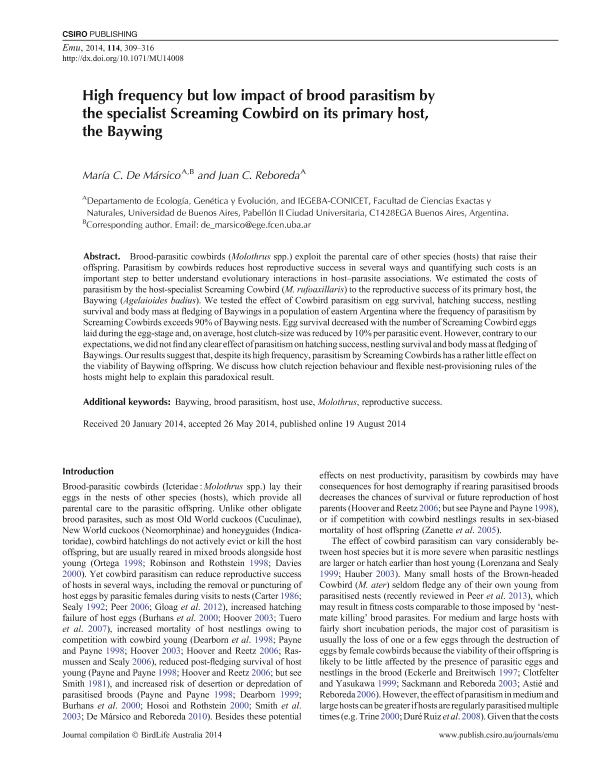Artículo
High frequency but low impact of brood parasitism by the specialist Screaming Cowbird on its primary host, the Baywing
Fecha de publicación:
05/2014
Editorial:
Csiro Publishing
Revista:
Emu
ISSN:
0158-4197
Idioma:
Inglés
Tipo de recurso:
Artículo publicado
Clasificación temática:
Resumen
Brood-parasitic cowbirds (Molothrus spp.) exploit the parental care of other species (hosts) that raise their offspring. Parasitism by cowbirds reduces host reproductive success in several ways and quantifying such costs is an important step to better understand evolutionary interactions in host-parasite associations. We estimated the costs of parasitism by the host-specialist Screaming Cowbird (M. rufoaxillaris) to the reproductive success of its primary host, the Baywing (Agelaioides badius). We tested the effect of Cowbird parasitism on egg survival, hatching success, nestling survival and body mass at fledging of Baywings in a population of eastern Argentina where the frequency of parasitism by Screaming Cowbirds exceeds 90% of Baywing nests. Egg survival decreased with the number of Screaming Cowbird eggs laid during the egg-stage and, on average, host clutch-size was reduced by 10% per parasitic event. However, contrary to our expectations, we did not find any clear effect of parasitism on hatching success, nestling survival and body mass at fledging of Baywings. Our results suggest that, despite its high frequency, parasitism by Screaming Cowbirds has a rather little effect on the viability of Baywing offspring. We discuss how clutch rejection behaviour and flexible nest-provisioning rules of the hosts might help to explain this paradoxical result.
Palabras clave:
Baywing
,
Brood Parasitism
,
Host Use
,
Molothrus
,
Reproductive Success
Archivos asociados
Licencia
Identificadores
Colecciones
Articulos(IEGEBA)
Articulos de INSTITUTO DE ECOLOGIA, GENETICA Y EVOLUCION DE BS. AS
Articulos de INSTITUTO DE ECOLOGIA, GENETICA Y EVOLUCION DE BS. AS
Citación
Reboreda, Juan Carlos; de Marsico, Maria Cecilia; High frequency but low impact of brood parasitism by the specialist Screaming Cowbird on its primary host, the Baywing; Csiro Publishing; Emu; 114; 4; 5-2014; 309-316
Compartir
Altmétricas




